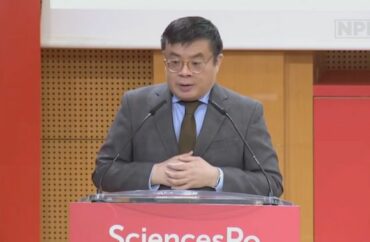
Journalism ethics expert says executive editors usually have ‘wide leeway’ with decisions
The Columbia Journalism Review fired Sewell Chan as its executive editor after he insisted on ethics, deadlines, and showing up in the office for work, the longtime journalist alleges. A journalism expert told The College Fix that it seems Chan acted appropriately and within his bounds as the executive editor.
Chan, who recently started a new job at the University of Southern California as a senior fellow in its Annenberg communications school, alleges the school fired him after “three pointed conversations.”
Chan (pictured) is the former editor of the Texas Tribune and also worked for the Los Angeles Times and New York Times.
“One was with a fellow who is passionately devoted to the cause of the Gaza protests at Columbia and had covered the recent detention of a Palestinian graduate for an online publication he had just written about, positively, for CJR,” Chan wrote in a LinkedIn post.
“I told him there was a significant ethical problem with writing for an outlet he had just covered,” Chan wrote.
This description fits CJR Journalism Fellow Meghnad Bose, who wrote an article about the Substack page Drop Site News for Columbia Journalism Review in February.
In late March, Bose wrote an article for Drop Site about Mahmoud Khalil, a Columbia University graduate and Palestinian activist, arrested by Immigration and Customs Enforcement on March 8. The article quotes Khalil’s claim that his arrest was a “direct consequence of exercising [his] right to free speech as [he] advocated for a free Palestine and an end to the genocide in Gaza.”
Bose did not respond to two emails sent in the past week that asked about the accuracy of Chan’s statements on what happened.
While Chan declined to comment further to The Fix, a journalism professor at DePauw University said, “it would seem [Chan] has a good point in trying to reel in the apparent conflict of interest for the one fellow.”
“This kind of management would be expected from an executive editor who values the reputation of his outlet,” Professor Jeffrey McCall told The Fix via email. McCall regularly writes about journalism ethics and the media.
“Normally, an executive editor has wide leeway in making personnel and content decisions, and it appears Chan was perhaps having his role undercut,” McCall said.
“Conflict of interest policies are essential to any media organization in that they protect both the readers and the reporters, and provide transparency for news decisions,” he said.
The second conflict occurred when Chan asked an editor to submit a story about sexual harassment involving a “prominent investigative reporter” to the dean for final approval. It had already passed legal review, Chan said.
“[The editor] asked for more time, to which I reluctantly acceded,” Chan wrote. “The story remains unpublished.”
This editor is most likely interim editor Betsy Morais, the only female editor listed on CJR’s masthead.
The Fix reached out to Morais on Monday, April 28, with a follow-up email on Thursday, May 1, asking whether Chan’s characterization of the interaction was accurate. She did not respond.
The final interaction Chan describes as being with “a staffer who declined to come into the office (even though the school requires attendance four days a week) and to write at least one story a week.” Chan says the school gave the employee “several months’ paid leave to look for a new job.”
The Fix could not identify this staffer.
The Fix also reached out to Jelani Cobb, the dean of the Columbia Journalism School, whom Chan blames for being fired. In the LinkedIn post, Chan calls Cobb’s decision “hasty, ill-considered, and quite frankly baffling.” Cobb did not respond to an April 28 email and a May 1 follow-up. Cobb also serves on the board of Ibram Kendi’s “antiracism newsroom,” the Emancipator.
Richard Florida, a visiting professor at Vanderbilt University with a doctorate from Columbia University, said in an email with The Fix that “[Columbia] university seems like it has more than a share of issues these days.” He had commented on Chan’s status in support.
The Fix also reached out to Andrew Lehren, an investigative journalist who commented on the post, calling Chan “a bastion of media ethics.” Lehren did not respond to an April 28 email and a May 1 follow-up.
“In a precarious and declining news industry that has lost economic, political, social and even moral capital, the only thing I have as a journalist is my reputation,” Chan wrote in a comment on his own post. “I intend to defend it.”
“These are normal workplace interactions and I did exactly what I was hired to do, which was to provide rigorous, fair, careful editorial oversight and raise the metabolism and impact of a publication that’s supposed to monitor the media,” Chan concluded in his LinkedIn post.
MORE: Maine teacher calls on Secret Service to ‘take out’ Trump
IMAGE CAPTION AND CREDIT: Former Columbia Journalism Review Executive Editor Sewell Chan;Ecolede Journalisme de Sciences Pro/YouTube
Like The College Fix on Facebook / Follow us on Twitter






Please join the conversation about our stories on Facebook, Twitter, Instagram, Reddit, MeWe, Rumble, Gab, Minds and Gettr.